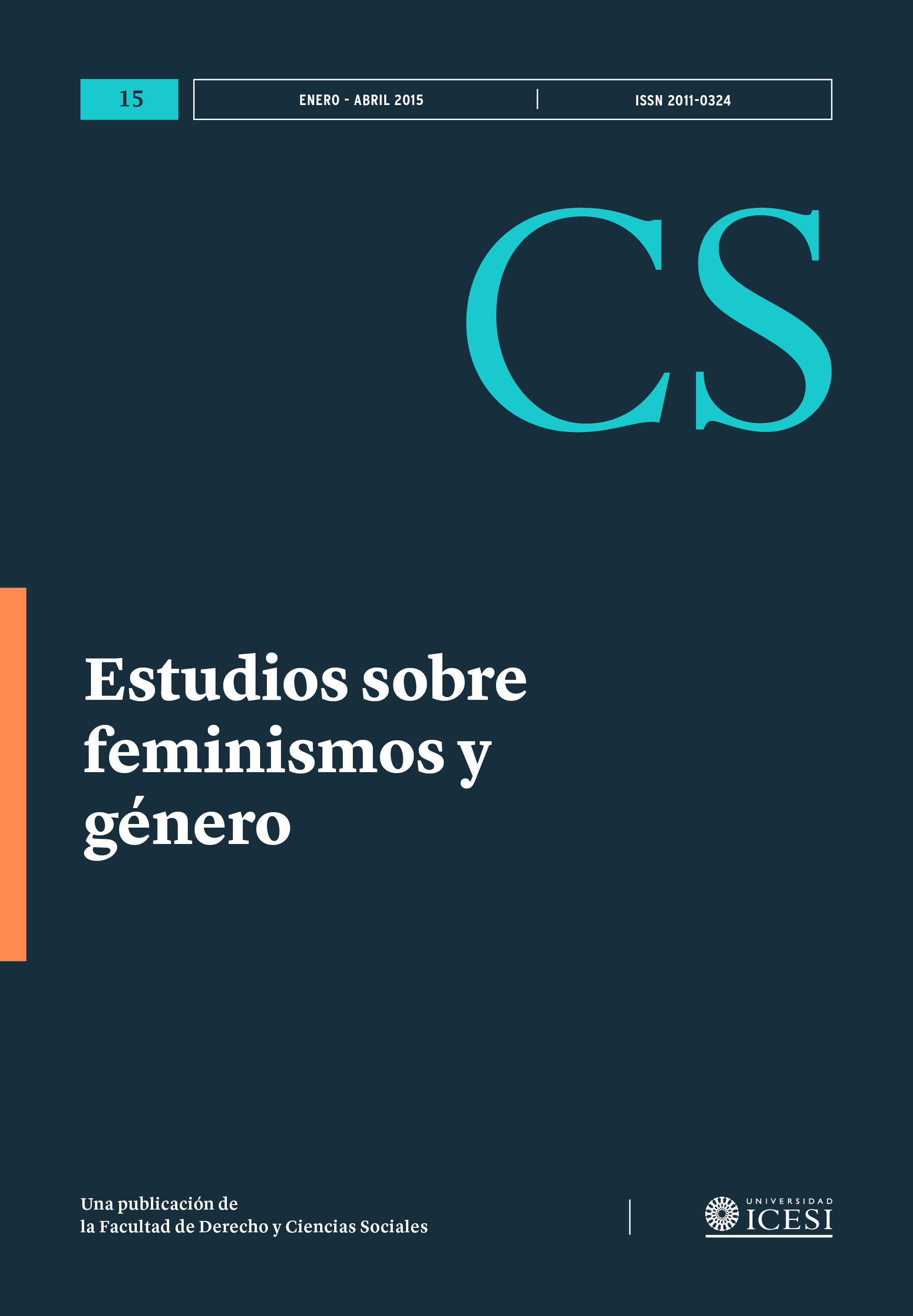Can we keep talking about “women” as a subject of feminist discourse?: Reflections from the perspective of divorced parents
DOI:
https://doi.org/10.18046/recs.i15.1941Keywords:
Feminism, men, women, masculinities, genderAbstract
This paper presents reflects upon the subject of feminist discourse based on the discourses of colombian male separated parents about changes in men and women and their perceptions of politics and equality. These discourses were obtained throughout a mixed research with 88 separated parents, ten of whom were interviewed in search of their perceptions from his experience of marital separation. The paper begins with the historical construction of feminism and ends with the discussion on the tensions and agreements with the groups of men and new masculinities.
Downloads
References
ALONSO, J. (2005). ''Marcela Lagarde: Una feminista contra el feminismo''. En: Revista Envío, Universidad Centroamericana UCA. (278).
BELTRÁN, E., MAQUIEIRA, V., ÁLVAREZ, S. Y SÁNCHEZ, C. (eds.) (2001). Feminismos. Debates teóricos contemporáneos. España, Madrid: Alianza Editorial.
BOLIO MÁRQUEZ, M. Y PINILLA MUÑOZ, D. (2015). El feminismo desde mi experiencia de vida construyendo puentes desde masculinidades diversas. Ponencia presentada en el V Coloquio Internacional de Estudios de Varones y Masculinidades. 14–16 enero 2015, Santiago de Chile.
BONINO, L. (2004). Obstáculos y resistencias masculinas al comportamiento igualitario. Una mirada provisoria a lo intra e intersubjetivo. Recuperado: http://www.lazoblanco.org wpcontent/uploads/2013/08manual/bibliog/material_masculinidades_0520.pdf
CONNELL, R. (1997). ''La organización social de la masculinidad''. En: Valdés, T. y Olavarría, J. (eds.) Masculinidad/es. Poder y crisis. Chile: Ediciones de las Mujeres, n° 24. Isis Internacio nal–Flacso Chile.
DE KEIJZER, B. (2001). Hasta donde el cuerpo aguante: Género, Cuerpo y Salud Masculina. Perú: Universidad Peruana Cayetano Heredia del Perú. Fondo Editorial.
FABBRI, L. (2015). ¿Qué (no) hacer con la masculinidad? Reflexiones activistas sobre los límites de los colectivos de varones/grupos de hombres. Ponencia presentada en el V Coloquio de Estudios de Varones y Masculinidades. 14–16 enero 2015, Santiago de Chile.
FIRESTONE, S. (1970). The dialectic of sex: The Case for Feminist Revolution. Nueva York: Bantam Books
FRIEDAN, B. (1964). The Feminine Mystique. New York: Norton.
FUNDACIÓN PADRES POR SIEMPRE. (2015). ¿Quiénes somos? Disponible en: http://www. padresporsiempre.com/quienes_somos.html
GODOY, F. (2010). Glosario de términos sobre género, sexualidad y discriminación. Amnistía Internacional Sección Chilena. Disponible en: http://www.amnistiapr.org/ educacion/presentaciones/glosarioterminos.pdf
LAGARDE, M. (1996). Género y feminismo. Desarrollo humano y democracia. Madrid: Horas y Horas la editorial.
MILLET, K. (1970). Sexual Politics. Nueva York: Avon Books.
MIYARES, A. (1999). ''Feminismo y no ''mujerismo''. En: Revista Meridiam. Recuperado de: http:// aliciamiyares.com/?p=172
THOMAS, F. (2009). ''A nueva mujer, nuevo hombre''. Universidad de Antioquia. Memorias Cátedra Pública, pp.108–116
VALCÁRCEL, A. (2008). Feminismo en el mundo global. Ediciones Cátedra. Universitat de Valencia. Instituto de la mujer, Madrid.
VAN LAERE (2010). El resurgir de lo femenino. Claves para sanar la represión de lo femenino, inhibidora de la felicidad humana. Madrid: Gaia Ediciones.
Downloads
Published
Issue
Section
License
Copyright (c) 2015 Anni Marcela Garzón Segura

This work is licensed under a Creative Commons Attribution-NonCommercial 4.0 International License.
© Reserved Copyright
Material in this publication may be reproduced without authorization, provided the title, author and institutional source is acknowledged.
The content published in Revista CS is distributed under the Creative Commons BY-NC 4.0 Attribution/Recognition-NonCommercial 4.0 International license.
You are free to:
Share — copy and redistribute the material in any medium or format.
Adapt — remix, transform, and build upon the material.
Under the following terms:
Attribution — You must give appropriate credit , provide a link to the license, and indicate if changes were made . You may do so in any reasonable manner, but not in any way that suggests the licensor endorses you or your use.
NonCommercial — You may not use the material for commercial purposes.












